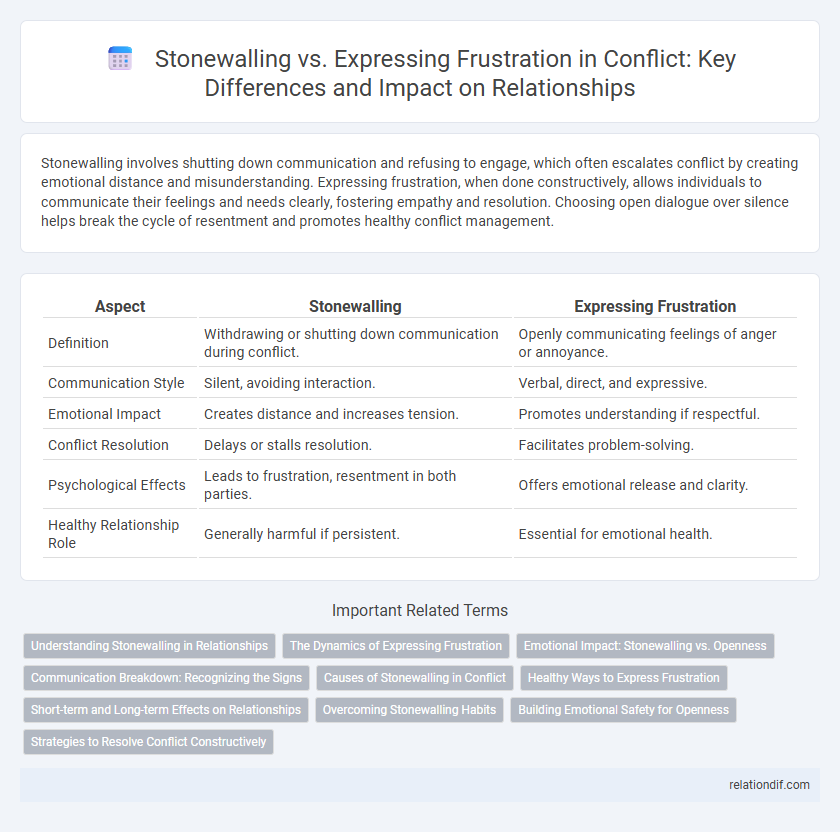Stonewalling involves shutting down communication and refusing to engage, which often escalates conflict by creating emotional distance and misunderstanding. Expressing frustration, when done constructively, allows individuals to communicate their feelings and needs clearly, fostering empathy and resolution. Choosing open dialogue over silence helps break the cycle of resentment and promotes healthy conflict management.
Table of Comparison
| Aspect | Stonewalling | Expressing Frustration |
|---|---|---|
| Definition | Withdrawing or shutting down communication during conflict. | Openly communicating feelings of anger or annoyance. |
| Communication Style | Silent, avoiding interaction. | Verbal, direct, and expressive. |
| Emotional Impact | Creates distance and increases tension. | Promotes understanding if respectful. |
| Conflict Resolution | Delays or stalls resolution. | Facilitates problem-solving. |
| Psychological Effects | Leads to frustration, resentment in both parties. | Offers emotional release and clarity. |
| Healthy Relationship Role | Generally harmful if persistent. | Essential for emotional health. |
Understanding Stonewalling in Relationships
Stonewalling in relationships involves emotionally shutting down and refusing to engage during conflicts, which exacerbates misunderstandings and hinders resolution. Unlike expressing frustration, which communicates feelings and invites dialogue, stonewalling creates distance and fosters resentment between partners. Recognizing stonewalling as a destructive pattern is essential for improving communication and repairing emotional connections.
The Dynamics of Expressing Frustration
Expressing frustration involves openly communicating emotions and concerns, fostering understanding and resolution within conflict dynamics. Stonewalling, characterized by withdrawal and silence, often escalates tensions by blocking emotional expression and dialogue. Recognizing these contrasting responses influences conflict outcomes, promoting healthier interactions and emotional regulation.
Emotional Impact: Stonewalling vs. Openness
Stonewalling in conflict often leads to increased emotional distance and feelings of rejection, intensifying frustration and resentment. Expressing frustration openly promotes emotional validation and understanding, fostering connection and reducing emotional distress. The emotional impact of openness supports healthier communication patterns, while stonewalling risks escalating conflicts by shutting down dialogue.
Communication Breakdown: Recognizing the Signs
Stonewalling occurs when one partner shuts down and refuses to engage in communication, causing emotional distance and unresolved conflict. Expressing frustration involves openly sharing feelings but can escalate if not managed calmly, often signaling a breakdown in understanding. Recognizing these signs is crucial for restoring effective dialogue and preventing further relational damage.
Causes of Stonewalling in Conflict
Stonewalling in conflict often stems from overwhelming stress and emotional flooding, which triggers the brain's fight-or-flight response, leading to withdrawal as a form of self-protection. It can also arise from a fear of escalation or worsening the situation, causing individuals to shut down rather than confront the issue directly. Chronic communication patterns involving criticism or contempt increase the likelihood of stonewalling as a defensive mechanism to avoid further emotional harm.
Healthy Ways to Express Frustration
Expressing frustration in healthy ways involves clear communication, using "I" statements to convey personal feelings without blaming others, and practicing active listening to understand different perspectives. Stonewalling, characterized by shutting down or refusing to engage, often exacerbates conflicts and hinders resolution by creating emotional distance and misunderstandings. Techniques such as taking deep breaths, setting boundaries for time-outs, and seeking constructive dialogue support emotional regulation and foster mutual respect during disagreements.
Short-term and Long-term Effects on Relationships
Stonewalling during conflict often leads to short-term relief but causes long-term damage by fostering emotional distance and resentment, undermining trust and communication. Expressing frustration, when done constructively, can enhance short-term understanding and long-term relationship growth by promoting openness and emotional intimacy. Couples who avoid stonewalling and engage in healthy expression of emotions tend to experience stronger, more resilient relationships over time.
Overcoming Stonewalling Habits
Overcoming stonewalling habits requires recognizing emotional withdrawal as a barrier to effective communication during conflicts. Encouraging open expression of frustration through safe, non-judgmental dialogue promotes emotional transparency and breaks down defensive walls. Consistently practicing active listening and empathy fosters trust and reduces the tendency to shut down, paving the way for conflict resolution.
Building Emotional Safety for Openness
Stonewalling during conflict blocks emotional connection, increasing tension and shutting down communication, while expressing frustration respectfully fosters understanding and emotional safety. Creating a safe space for open dialogue requires acknowledging feelings without judgment, encouraging vulnerability, and validating each other's experiences. Prioritizing emotional safety reduces defensiveness, promotes empathy, and builds trust essential for resolving conflicts constructively.
Strategies to Resolve Conflict Constructively
Stonewalling, characterized by emotional withdrawal and refusal to communicate, hinders conflict resolution by escalating misunderstandings, whereas expressing frustration through clear, assertive communication fosters mutual understanding. Strategies to resolve conflict constructively include active listening, validating emotions, and using "I" statements to express feelings without blame. Implementing techniques such as timed breaks to cool down and collaborative problem-solving promotes healthy dialogue and prevents destructive silence associated with stonewalling.
Stonewalling vs expressing frustration Infographic

 relationdif.com
relationdif.com